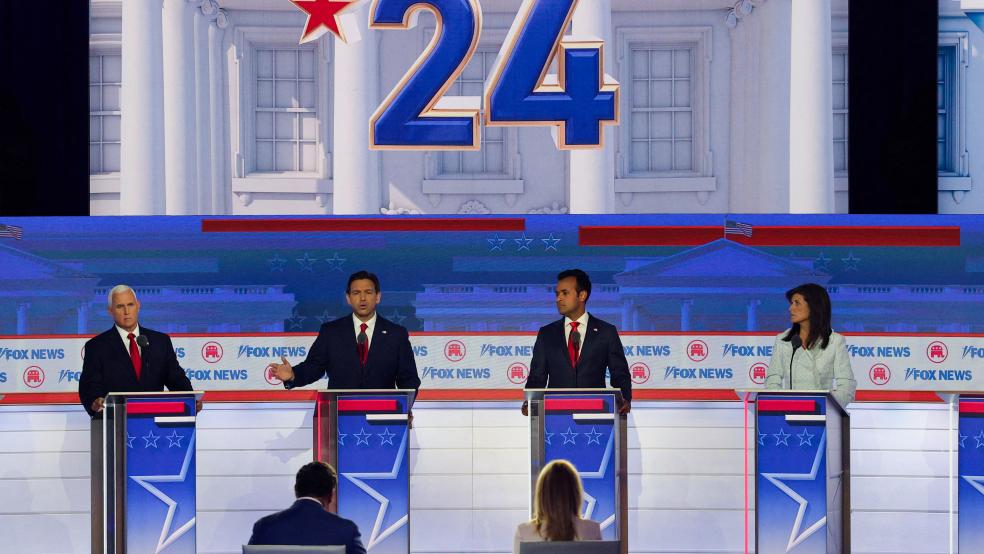Although the opening exchanges of last night’s Republican presidential primary debate aren’t making many highlight reels and recaps, they showed the candidates trying to establish their fiscally conservative bona fides. Government spending was a common target of criticism, but the back and forth also highlighted a few areas where differences have emerged. Here’s a look at what some of the candidates said and why it might matter.
Ron DeSantis: The Fox News moderators kicked off the debate by showing a clip of President Joe Biden saying that his economic agenda is working. They then transitioned to ask why most Americans say the country is headed in the wrong direction and why the country song “Rich Men North of Richmond” by a singer from Farmville, Virginia, named Oliver Anthony has become a viral chart-topping hit. The song discusses inflation, taxes and a frustration with government and has been boosted by conservative pundits and politicians.
“Our country is in decline,” the Florida governor said in response to the opening question. He argued that the country must reverse Bidenomics to give middle-class families a chance to succeed. “We also cannot succeed when the Congress spends trillions and trillions of dollars,” DeSantis added. “Those rich men north of Richmond have put us in this situation.”
Chris Christie: The former New Jersey governor also attacked government spending. “We cannot sit by any longer and allow the kind of spending that’s going on in Washington because every dollar that they spend is a dollar that these people are not allowed to spend on their children and their grandchildren,” he said, pointing to the audience. “It’s robbing our country and it’s wrong.” Asked about his record in New Jersey, Christie said he cut debt and public employee pension payments to benefit taxpayers.
Tim Scott: The senator from South Carolina was asked by moderator Martha MacCallum what he has done “to rein in the increasing size of government.” He talked about voting against spending packages, advocated for sending money and spending decisions back to the states and touted the 2017 Tax Cuts and Jobs Act (which is expected to add some $2 trillion to deficits over 10 years). “If you don’t send it to Washington, we can’t spend it,” he said in calling for more tax cuts.
Nikki Haley: The former South Carolina governor and United Nations ambassador, said Republicans bear some blame for the nation’s fiscal challenges. “The truth is that Biden didn’t do this to us. Our Republicans did this to us, too. When they passed that $2.2 trillion Covid stimulus bill, they left us with 90 million people on Medicaid, 42 million people on food stamps,” she said. “They need to stop the spending. They need to stop the borrowing. They need to eliminate the earmarks that Republicans brought back in.”
She said Republicans have asked for $7.4 billion in earmarks for the upcoming fiscal year compared to $2.8 billion requested by Democrats. “So you tell me who are the big spenders,” she said.
Haley also specifically criticized former president Donald Trump and some of those on stage with her for adding to the national debt. “Donald Trump added $8 trillion to our debt and our kids are never going to forgive us for this,” she said.
In an appearance on Bloomberg Television this morning, Haley again blamed Republicans for “spending like drunken sailors and raising the debt limit.” She called for increasing the Social Security retirement age for people coming into the system, calling age 65 “way too low” without specifying a new number. (The age for full retirement benefits is now 67 for people born in 1960 or later.)
“We go to people like my kids in their 20’s when they’re coming into the system and we say the rules have changed,” Haley proposed. “We change retirement age to reflect life expectancy. Instead of cost-of-living increases, we do it based on inflation. We limit the benefits on the wealthy, and we expand Medicare Advantage plans.”
Haley also criticized other GOP candidates who have steered clear of calling for cuts or changes to Social Security. “You’ve got multiple candidates on that stage that said they wouldn’t touch entitlements,” she said. “Any candidate that says they’re not going to touch entitlements means that they’re basically going to go into office and then leave America bankrupt.” (The U.S. government can’t go bankrupt.)
Mike Pence: Calling himself the conservative best prepared to be president, Pence highlighted his call for reforms to Social Security and Medicare to reduce the costs of those programs. “I was the first person in this race to say that we’ve got to deal with the long-term national debt issues,” he said. “You’ve got people on this stage that won’t even talk about issues like Social Security and Medicare.”
Asa Hutchinson: The former Arkansas governor and former member of the House highlighted how he shrank the size of government in his state and brought up his proposal to cut the federal non-defense workforce by 10%.
Why it matters: While the on-stage sparring, individual performances and differences on subjects including abortion and Ukraine have gotten the bulk of the post-debate coverage, the portion of the debate that touched on economic and budgetary matters highlights a divide in the Republican Party between those embracing a traditional, pre-Trumpian Republican view of entitlements and candidates who are more wary of rhetoric that could alienate voters who oppose cuts to those programs.
Haley’s jabs at her fellow Republicans will provide some ammunition for President Joe Biden and Democrats. In fact, they already are, as Biden posted a clip of Haley’s remarks about Trump adding $8 trillion to the debt with the comment, “What she said.”





